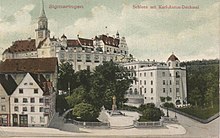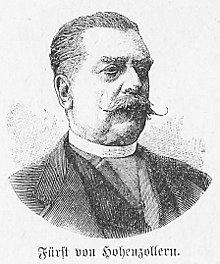Karl Anton (Hohenzollern)
Karl Anton Joachim Zephyrinus Friedrich Meinrad von Hohenzollern (born September 7, 1811 in Krauchenwies , † June 2, 1885 in Sigmaringen ) was the last ruling prince of Hohenzollern-Sigmaringen from August 27, 1848 to December 7, 1849 before it was incorporated into Prussia . He continued to be the (titular) prince of his house and, following the death of the last prince of Hohenzollern-Hechingen in 1869, prince of the entire princely house of Hohenzollern . Between 1858 and 1862 he also served as Prussian Prime Minister .
Life
Karl Anton was born as the second child of Prince Karl von Hohenzollern-Sigmaringen (1785–1853, Prince from 1831 to 1848) and the French Princess Antoinette Murat (1793–1847) at Krauchenwies Castle . He studied law in Geneva , the University of Tübingen and Berlin and wrote many homesick letters home. In the Principality of Hohenzollern-Sigmaringen he then worked in the local assembly of estates and administration.
On October 31, 1834, he married Josephine (1813–1900), daughter of Grand Duke Carl von Baden, in Karlsruhe . Karl's mother Antoinette and Josephine's mother Stéphanie de Beauharnais knew each other from the renowned institute of Madame Campan in Paris .
Regency and abdication
His father resigned in favor of Karl Anton against the background of the revolution in Sigmaringen in 1848. This originally intended to completely renounce the country's sovereign rights. For this purpose he negotiated with the Provisional Central Authority in Frankfurt. However, these negotiations did not lead to any result. In the principality itself the revolutionary movement became radicalized. There was a dispute with the estates over the princely domains. These disputes forced Karl Anton to temporarily leave the principality. In the course of the counter-revolution in the summer of 1849, the country was occupied by Prussian troops. On December 7, 1849, Karl Anton ceded the principality in a state treaty in exchange for compensation to the Prussian crown. After his abdication as prince in favor of Prussia, Karl Anton became commander of the 14th division in Düsseldorf on April 15, 1852 , where he resided with his family in Jägerhof Palace . On March 22, 1853 he was promoted to lieutenant general. At the beginning of the Crimean War he was sent to Paris as an envoy. He was supposed to prevent an anti-Russian coalition between France and Great Britain.

Prime Minister of Prussia
Karl Anton also had good relations with Prince Wilhelm of Prussia . After this had taken over the regency, he transferred Karl Anton on November 5, 1858 "the Presidium of the State Ministry", d. H. the office of the Prussian Prime Minister, and asked him to "submit his proposals for the composition of the new ministry as soon as possible". He was thus head of government in the time of the New Era . On the following day, Wilhelm agreed to the Prime Minister's proposals and appointed Eduard von Flottwell as Minister of the Interior, Rudolf von Auerswald as Minister without Portfolio , Alexander von Schleinitz as Foreign Minister, Eduard von Bonin as Minister of War, Robert von Patow as Minister of Finance, the Count von Pückler as Minister of Agriculture and Moritz August von Bethmann-Hollweg as Minister of Education. Karl Anton took over two ministers from the previous government: Trade Minister August von der Heydt and Justice Minister Ludwig Simons , who were thus "confirmed in their previous offices" by Wilhelm. Politically, Karl Anton was close to the moderate liberalism of the Wochenblatt party . Internally, he tried to carry out these reforms in a liberal sense. On the outside, it aimed at a unification of the German states. In particular, the European crisis resulting from the war in Italy caused his plans for Germany to fail. Between November 22, 1858 and June 28, 1860 he also served as the commanding general of the VII Army Corps , and on May 31, 1859 he reached the rank of general of the infantry . Domestically, there was initially cooperation with liberalism, which made up the majority in the Prussian House of Representatives. However, the conflict over the military structure led to the army conflict . Karl Anton supported the plans of Albrecht von Roon , but also pleaded for a greater opening of the officer's career to commoners. The state elections of 1861 ended with the victory of the Progressive Party , which resolutely rejected the military plans. With this, Karl Anton lost political support in the Chamber. Within the cabinet he had difficulties asserting himself between the liberal members around August von der Heydt and the conservatives around Roon. On March 12, 1862, his time as Prime Minister ended.
End of life
In 1866 his son Karl was elected Prince of Romania. In February 1870, his other son Leopold was offered the Spanish throne. Karl Anton was urged by Otto von Bismarck to accept the offer. Only after hesitation did he respond. In view of the relationship with the French houses of Murat and Bonaparte, it seemed to him that Napoleon III agreed . to be possible. When the candidacy threatened to ignite a European crisis, Karl Anton withdrew the candidacy on July 12, 1870. This step was no longer sufficient to prevent the Franco-Prussian War of 1870/71, because the Emser dispatch came just one day later . During the war, Karl Anton did not hold any front command, but held the position of military governor for the Rhine Province and the Province of Westphalia with the rank of Commanding General .

In 1871, Sigmaringen became Karl Anton's permanent residence again, where he also spent the last years of his life as a passionate cigar smoker, burdened by paralysis of his legs. In 1884 the couple celebrated their golden wedding with a thirteen-course menu. The prince was an avid art collector and even then offered his subjects the opportunity to view his art treasures.
Awards
(incomplete)
- 1831 Grand Cross of the Baden House Order of Loyalty
- 1832 Grand Cross of the Württemberg Order of Frederick
- 1834 Grand Cross of the Baden Order of the Zähringer Lion
- 1845 Grand Cross of the Order of the Württemberg Crown
- In 1856 he was made an honorary citizen by the city of Düsseldorf .
progeny
The following children were born from his marriage to Josephine:
- Leopold (1835–1905), Prince of Hohenzollern
- ⚭ 1861 Princess Antonia of Portugal (1845–1913)
- Stephanie (1837-1859)
- ⚭ 1858 King Peter V of Portugal (1837–1861)
- Carol I (1839–1914), King of Romania
- ⚭ 1869 Princess Elisabeth zu Wied (1843–1916)
- Anton (1841–1866), killed in the Battle of Königgrätz
- Friedrich (1843–1904)
- ⚭ 1879 Princess Louise of Thurn and Taxis (1859–1948)
- Marie (1845-1912)
- ⚭ 1867 Prince Philip of Belgium (1837–1905)
See also
literature
- Herman Granier : Hohenzollern-Sigmaringen, Karl Anton Prince of . In: Allgemeine Deutsche Biographie (ADB). Volume 51, Duncker & Humblot, Leipzig 1906, pp. 44-52.
- Karl Theodor Zingeler: Karl Anton, Prince of Hohenzollern. A picture of life based on the papers he left behind . Stuttgart 1911 Internet Archive .
- Günter Richter: Hohenzollern-Sigmaringen, Karl Anton Prince of. In: New German Biography (NDB). Volume 9, Duncker & Humblot, Berlin 1972, ISBN 3-428-00190-7 , p. 502 f. ( Digitized version ).
- Hugo Lacher: Prince Karl Anton von Hohenzollern . In: Hohenzollern (= writings on political regional studies of Baden-Württemberg , 23). Stuttgart 1996, ISBN 978-3-17-012885-9 , pp. 476-480
- Edwin Ernst Weber: Noble Modernization Strategies in the 19th Century. The princes Anton Aloys, Karl and Karl Anton von Hohenzollern-Sigmaringen . In: Mark Hengerer (Ed.): Adel im Wandel . Volume 1. Ostfildern 2006, pp. 399-414.
- In the peace of a princely patriot . In: The Gazebo . Issue 31, 1867, pp. 484-487 ( full text [ Wikisource ]).
Web links
- bibliography
- The family tree ( memento from July 20, 2011 in the Internet Archive ) on the website of the Fürst von Hohenzollern Group
- Estate of Prince Karl Anton in the Sigmaringen State Archive , House Archive Hohenzollern-Sigmaringen: Estate of Prince Karl Anton von Hohenzollern (1811–1885)
Individual evidence
- ↑ a b c d e Anderson-Fahlbusch (maf): History comes to life . In: Südkurier of October 26, 2011
- ^ From Paris to Krauchenwies - Migration in the service of the dynasty using the example of Antoinette Murat . Lecture by Carmen Ziwes on November 25, 2010 in Krauchenwies
- ↑ GStA PK I. HA Rep. 89 No. 3693, fol. 91 r
- ↑ GStA PK I. HA Rep. 90 A No. 2350
- ↑ Menu card is exhibit of the month . In: Südkurier , September 6, 2011
- ↑ Court and State Handbook of the Grand Duchy of Baden , 1847, p. 33
- ^ Court and State Manual of the Kingdom of Württemberg 1866 , p. 54
- ↑ Court and State Handbook of the Grand Duchy of Baden , 1847, p. 48
- ↑ Court and State Handbook of the Kingdom of Württemberg 1866 , p. 30
| predecessor | Office | successor |
|---|---|---|
| Karl |
Prince of Hohenzollern-Sigmaringen 1848–1849 |
to the Kingdom of Prussia ( Friedrich Wilhelm IV. ) |
| --- |
Head of the Princely House of Hohenzollern 1869–1885 |
Leopold |
| personal data | |
|---|---|
| SURNAME | Karl Anton |
| ALTERNATIVE NAMES | Hohenzollern-Sigmaringen, Karl Anton Joachim Zephyrin Friedrich Meinrad von |
| BRIEF DESCRIPTION | last prince of the Hohenzollern ancestral land |
| DATE OF BIRTH | September 7, 1811 |
| PLACE OF BIRTH | Krauchenwies |
| DATE OF DEATH | June 2, 1885 |
| Place of death | Sigmaringen |



